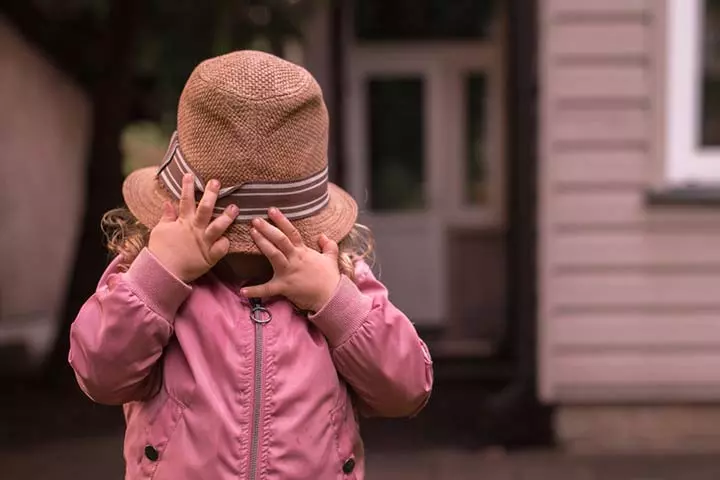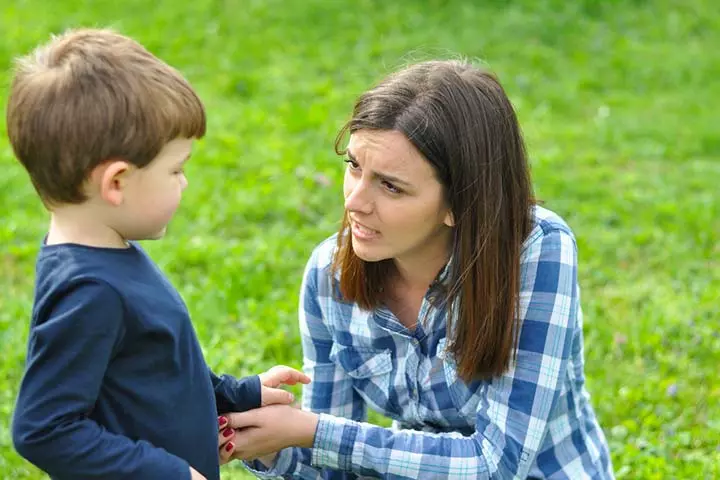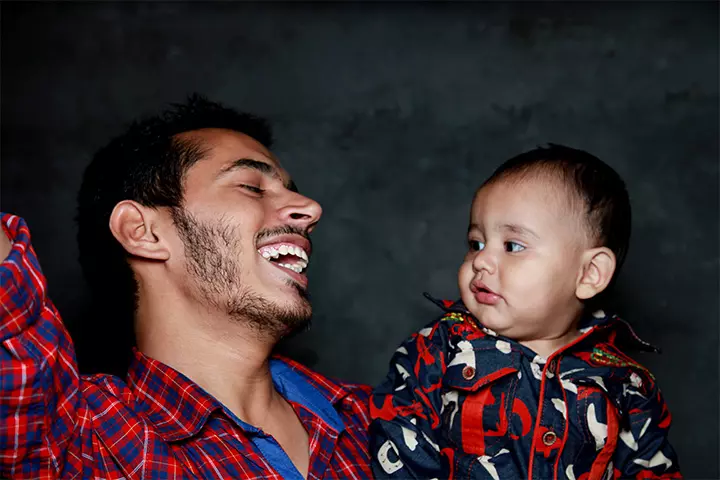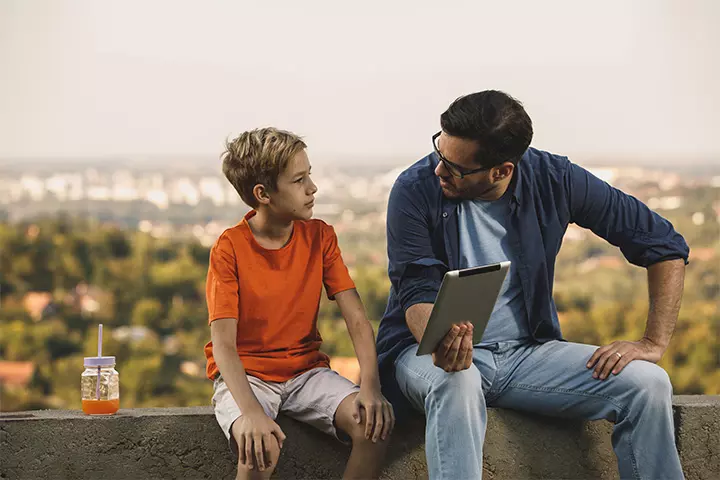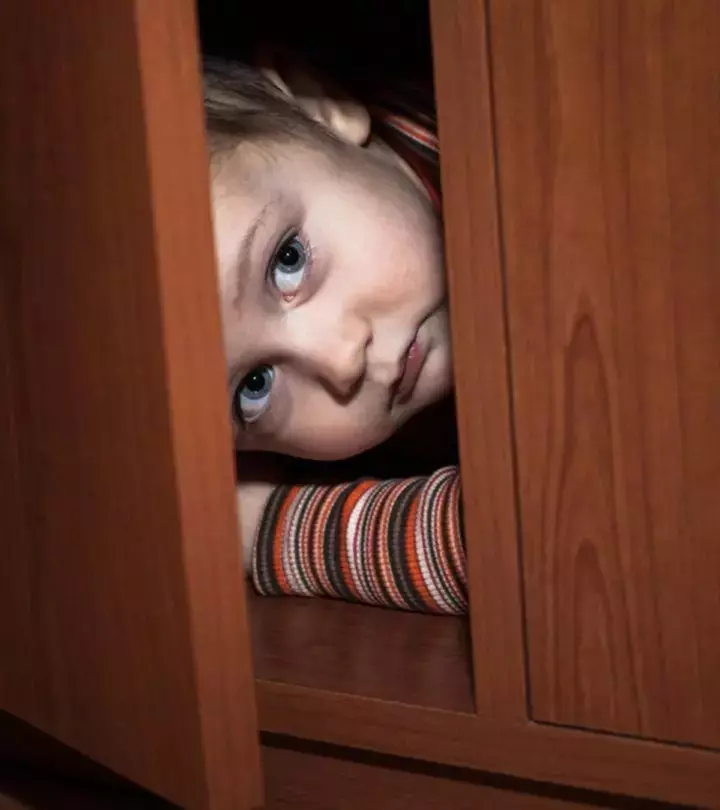

Image: Shutterstock
Have you noticed how people expect babies to be cheerful, hyper, and outgoing? You would have observed your relatives, parents, and even friends who have toddler kids trying to show their baby off in front of other people — colleagues, guests, friends, family, and relatives. They might tell their little ones to dance, sing, or entertain these people. Some kids are excited to present themselves in front of people, which is great. But some toddlers are shy and refuse to be showcased like a pony, which is also okay. However, most parents probably find this upsetting because they expect their kids to be friendly and open to acquaintances.
Shy toddlers, just like many shy adults, have their own way of communicating and reacting to things. They might not follow the norm that everyone has set about how a child should behave or act. After all, they’re shy and they can feel their own set of discomfort and struggles.
We’re here to tell you that there’s nothing wrong with that. However, if your little one seems extra shy and terrified of strangers to a point where they cry and throw tantrums when they meet someone new, here are a few ways in which you can try to help them. Scroll below to know more:
1. Understand Your Child
Image: Shutterstock
Every child is different. It’s important to understand that your child is not you. So, if you are a social butterfly who loves being in the limelight, your kid doesn’t have to follow suit. They might be different, and that’s okay. Your kid might want a quiet birthday with their three close friends instead of a full-on birthday bash with all their classmates. There’s nothing wrong with that, and you must understand it.
Understanding your child is so important. They might act shy in front of one set of people and then totally lose their shyness with others. Try to identify the exact situations where your child feels the most uncomfortable. This will better help you handle your kids’ struggles. However it is common for some kids to feel alien in front of people they don’t recognize. They just like to be in their comfort zone. Find out what your child’s possible trigger is.
2. Separation Anxiety Versus Stranger Anxiety
Image: Shutterstock
Understand that stranger anxiety is common in babies. They usually start around eight months and can last for up to two years. Your baby gets used to familiar faces — their parents, siblings, close relatives, and grandparents. Any new faces that they see other than the ones who are commonly around them may make them fussy, fearful, or cranky. You can gradually introduce them to new faces to help your kid (1).
3. Transitions Can Be Tricky
Image: Shutterstock
Nobody likes change, and everybody struggles with readily accepting change. Your toddler is in the same boat. Babies thrive on routine, and when that gets disrupted, they can find it hard to adjust. If your toddler is introduced to new faces, it might take a while to get used to them. So giving them time is crucial. For example, a new babysitter might trigger some unpleasant reaction from your toddler. However, remember that it’s completely normal.
4. Monitor Your Toddler’s Behavior
Image: Shutterstock
We’ve established that it’s common for your toddler to be uncomfortable around new people. However, how they react to the situation is what you need to consider closely. Some toddlers might cry, fuss or even throw tantrums. Others might bury their face in your arms or legs until you give them attention. All these reactions are normal. However, the one thing you SHOULD NOT entertain is when your toddler hits you — that’s a strict NO! It’s not acceptable and should be corrected.
5. Focus On Positive Interactions
Image: Shutterstock
Ensure that the new people your toddler meets are encouraging and engage in positive interactions. If your toddler meets someone new who is judgmental, they are bound to become more scared than they were before. Wouldn’t you? Therefore, limit those uncomfortable conversations with strangers and enforce rather positive interactions. If your child is scared of strangers, positive interactions with new people might help change that.
6. Let Them Take Their Time In Opening Up To Others
Image: IStock
With a shy child in tow, you can’t really expect to rush things up. Whether it’s interacting with you or with new acquaintances, they will take their own sweet time in opening themselves up. And oftentimes, it can be a good precedent for future habits and interactions. After all, we should always be a little cautious in opening up and letting people know our feelings too fast. Be patient and let your shy child grow comfortable around the new people you want them to interact with. If it’s other kids you want them to interact with, instead of directly telling them to talk with each other, you can try engaging them in some activity or play. Before you know it, your little one might start barbering and enjoying the company.
7. Nudge Them Towards Healthier Interactions
Image: IStock
We understand that you don’t want to push your child into interactions they feel uncomfortable in. However, letting them have their way and avoiding interactions altogether will be detrimental to their growth and development. Living in such a cocoon will limit their chances of having meaningful interactions and friendships that could shape their lives. So what you can do in such a case is gently nudge them towards interactions that you deem important in a subtle way they don’t recognize. You can do that by engaging them in plays or activities with other kids. Slowly they will surely lose the inhibitions and have better connections. Another way could be rewarding them with things they want for having successful interactions. These exchanges would slowly build up your little one’s courage and before you know it they will get used to interactions.
Remember that if you have a shy child, so be it. There is nothing wrong with being shy, and your kid need not be reminded of it every two seconds like it’s a bad quality. Sure, you might have wanted a friendly and social child, but that’s not who your toddler is. It’s best to accept them for who they are rather than trying to change them. Is your toddler scared of strangers? Comment below and let us know!
References
- Fear of strangers: babies and young children
https://raisingchildren.net.au/toddlers/behaviour/common-concerns/fear-of-strangers
Community Experiences
Join the conversation and become a part of our nurturing community! Share your stories, experiences, and insights to connect with fellow parents.




